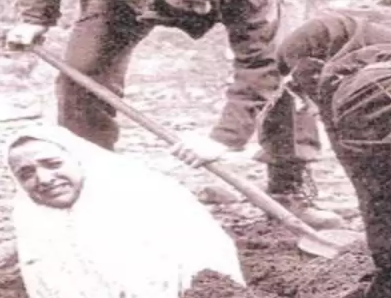December 31, 2021
Two men have been stoned to death for adultery while another escaped death by digging his way out of the hole in which he was buried to face stoning—an action that saves him from further stoning.

purported to show a women being prepared for
stoning just after the revolution.
The sentences follow sharp criticism by international human rights groups of Iran’s use of such punishments—though the sentence is rarely used any more and the last instance the Iran Times could find was a dozen years ago.
Judiciary spokesman Alireza Jamshidi told reporters November 30 about the stonings, which took place in Mashhad in early November.
The men had committed various crimes, including murder, Jamshidi said. Stoning is the punishment for adultery.
In keeping with standard practice, the men were buried up to their waists and people pelted them with stones until they died. Women sentenced to stoning are buried up to their chests, making it virtually impossible to dig themselves out. Most of those sentenced to stoning are women.
Last year, Amnesty International said, “Stoning is a horrific practice, designed to increase the suffering of those facing execution, and it has no place in the modern world.”
Jamshidi said a former Judiciary chief, Ayatollah Mahmud Hashemi-Shahrudi, who chaired the judicial branch from 1999 to 2009, had urged ending the practice and said a bill has long been pending in the Majlis to stop the punishment. But “until this measure is approved and becomes law, judges have the independence not to pay heed to the recommendations of a Judiciary chief,” Jamshidi said.
The current law calls for stones “large enough to cause pain, but not so large as to kill the victim immediately.”
Amnesty International said at least one stoning execution was carried out in 2007 in Qazvin province and a woman and a man were known to have been stoned to death in Mashhad in May 2006.
According to one tabulation published in 2013, at least 150 people had been stoned in Iran since 1980. Human Rights Watch, however, put the stoning toll in that period much lower, at at least 70. The two groups said about 10 or 12 people were then being held in jail awaiting stoning sentences.
The last reported case of stoning was carried out just before Now Ruz in 2009, when an unidentified man was stoned to death in Rasht on the Caspian coast.
In 2002, after vocal complaints from the European Union, a directive by then Judiciary chief Ayatollah Mahmud Hashemi-Shahrudi ordered the practice suspended while the penal code was reviewed.
Six years later, in August 2008, he submitted a revised penal code to the Majlis that deleted stoning as a punishment. The Majlis spent almost five years reviewing that draft before finally approving it and agreeing to drop stoning. But the Council of Guardians vetoed the absence of stoning as violating Sharia law.
Several Muslim-majority countries and states in Nigeria have stoning laws on their books. But the only countries were stonings have been carried out by the government in recent decades are believed to be Iran and Saudi Arabia.
“The majority of those sentenced to death by stoning are women. Women are not treated equally with men under the law and by courts, and they are also particularly vulnerable to unfair trials because their higher illiteracy rate makes them more likely to sign confessions to crimes they did not commit,” Amnesty international said of Iran.



















